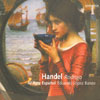Handel Rodrigo
Exciting but not an unqualified success
View record and artist detailsRecord and Artist Details
Composer or Director: George Frideric Handel
Genre:
Opera
Label: Ambroisie
Magazine Review Date: 12/2009
Media Format: CD or Download
Media Runtime: 0
Mastering:
Stereo
DDD
Catalogue Number: AM132

Tracks:
| Composition | Artist Credit |
|---|---|
| Rodrigo |
George Frideric Handel, Composer
Al Ayre Español Eduardo Lopéz Banzo, Conductor George Frideric Handel, Composer María Bayo, Esilena, Soprano Max Emanuel Cencic, Fernando, Mezzo soprano Sharon Rostorf-Zamir, Florinda, Soprano |
Author: David Vickers
Al Ayre Español’s execution of Rodrigo is a happier synthesis of vigour and charm than their recent recording of Amadigi (8/08) which set a new standard for abrasiveness in modern Baroque performance malpractice. This is a more judicious performance. The use of castanets in Esilena’s “Sì, che lieta godero” is tacky and daft (does being Spanish somehow justify this lapse of judgement?). Likewise, I groaned at the pointless tambourine rattle on the very last chord of the opera. Occasionally Banzo falls into the trap of misinterpreting allegro as presto, to the detriment of his singers.
María Bayo sings with a light timbre and is good at conveying words but her tuning is often flat and she struggles with coloratura; Esilena’s magnificent aria “Per dar pregio all’amor mio” that concludes Act 1 is distinctly underwhelming, especially when one looks in the score to check what should be happening. Sandrine Piau is much nobler and technically dependable on Alan Curtis’s neat performance of his own edition of the score (Virgin, 7/99). Curtis’s Gloria Banditelli is a more plausibly masculine tyrant than Banzo’s Maria Riccarda Wesseling, although Wesseling produces some strongly characterised and attractive singing. Kobie van Rensburg allies stylishness and expressiveness in his singing, even if Banzo’s shaping of rhythms seems erratic in several of his rousing arias. Max Emanuel Cencic is miscast in a part that contributes almost nothing to proceedings. Anne-Catherine Gillet sounds a bit stretched by the end, but otherwise does well in the small role of Evanco. Notwithstanding a few reservations, this is an involving presentation of the score that will interest devoted Handelians.
Discover the world's largest classical music catalogue with Presto Music.

Gramophone Digital Club
- Digital Edition
- Digital Archive
- Reviews Database
- Full website access
From £8.75 / month
Subscribe
Gramophone Full Club
- Print Edition
- Digital Edition
- Digital Archive
- Reviews Database
- Full website access
From £11.00 / month
Subscribe
If you are a library, university or other organisation that would be interested in an institutional subscription to Gramophone please click here for further information.




